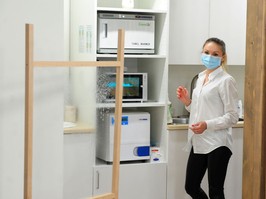if how a vagina should smell is one of those questions that falls under the umbrella of things you’ve always wondered about, but are too embarrassed to ask, we feel you. but how you take care of your vagina is important, not only for physical health, but also emotional health — myths around how things should be “down there” can affect a woman’s sexual self-esteem and contribute to anxiety. since vaginas don’t come with an instruction manual, we reached out to an expert for some tips on how keep this important female body part in tip top shape.dr. melanie atlas, director, multidisciplinary vulvodynia program at the
bc centre for vulvar health and clinical assistant professor, department of obstetrics & gynaecology and the university of british columbia, treats women with vulvar and vaginal conditions. she says that daily skin care practices and the use of feminine hygiene products can contribute to a whole host of vaginal issues and exacerbate existing conditions.her bottom line message? be nice to your vagina.
is there a “right” way for a vagina to smell?
many women have been led to believe that the vulva and vagina should look and smell a certain way. but this is not true. these beliefs can affect sexual self-esteem and cause shame, anxiety and embarrassment. the feminine hygiene industry relies on us believing in the odourless or floral-smelling vagina myths.the vulva and vagina are designed to keep themselves healthy. the body’s natural bacteria, specifically lactobacillus, make the vaginal environment slightly acidic. these bacteria also contribute to the production of vaginal mucous. both the acidity and protective barrier prevent unfriendly bacteria from causing problems.
feminine hygiene products are a waste of money
the use of feminine hygiene products can disrupt the bacteria’s ability to carry out this protective function. at best, these products are money not well spent. at worse, the ingredients in feminine products can cause inflammation of the skin, or allow harmful bacteria to cause infection.it is well known that the vulva and vagina are self-cleaning. douches, wipes and sprays are unnecessary. warm water and a soft cloth are all that is needed to wash the vulva. if a woman prefers using soap, i recommend an unscented soap for sensitive skin. the vagina does not require any cleaning at all. truly, a minimalist approach is best.
skip the powders
using baby powder on the genitals is not a common practice that i have encountered. i also can’t recall a patient asking me about it. however, my understanding is that the research linking baby powder to ovarian cancer is inconclusive.
vaginas should smell like vaginas, not candles
i have heard about the
goopthis smells like my vagina candle. certainly, the vulva and vagina are not supposed to smell like geraniums, bergamot or cedar. my concern is that products like this reinforce the myth of what is a healthy genital scent. vaginas should smell like vaginas. and that will be different for every woman. the smell may change throughout the menstrual cycle or as a woman ages.
if things smell fishy, see a doctor
you should see your doctor if you notice a strong “fishy” smell. this may indicate a genital infection such as bacterial vaginosis or trichomoniasis.
dr. melanie atlas, director, multidisciplinary vulvodynia program at the b.c. centre for vulvar health and clinical assistant professor, department of obstetrics & gynaecology at the university of british columbia.don’t miss the latest on covid-19, reopening and life. subscribe to healthing’s daily newsletter coming out of covid

 3 minute read
3 minute read




